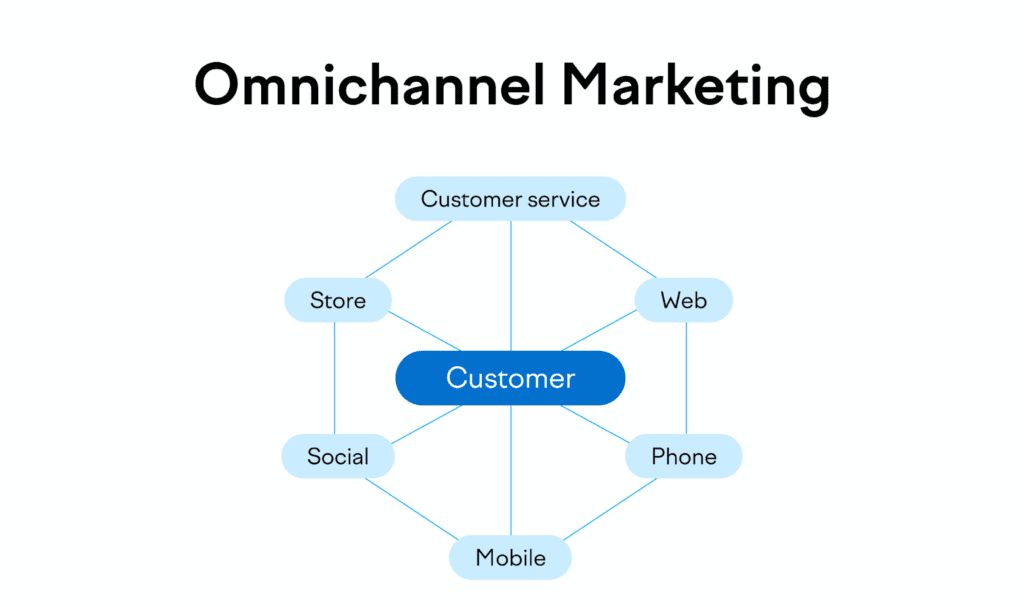Omnichannel marketing requires a commitment to customer-centric personalization that supports business value. Successful omnichannel strategies combine multiple marketing and customer service efforts, such as social media messaging, community forums, FAQs, and self-service channels.
Message consistency across platforms and engagement channels is another crucial component of omnichannel marketing. For example, when someone receives a winter sale promotion via email or web push notification, she should also see the same promotion when she logs into her brand’s online store.
Unify Your Marketing Channels
A successful omnichannel marketing strategy provides a consistent message to customers on all platforms and devices. This is a big challenge for many brands, but several things can be done to create a seamless customer experience.
Map out your customers’ journeys through all of your channels first. This will give you an idea of where your customers spend their time and money. You can then use this information to create the most effective targeted campaigns.
Next, ensure your website is mobile-friendly so customers can browse and shop on any device they choose. Given that most consumers now make online purchases using smartphones, this will also help you reach a larger audience.
Finally, consider integrating your physical channels into your omnichannel strategy. This can include events, trade shows, and experiential marketing campaigns. These can assist you in increasing brand recognition and building strong emotional bonds with your clientele.
Finally, ensure your customer service teams work together to provide a seamless experience. This can be challenging, but setting clear expectations and encouraging communication between departments is essential. Having a tool to help you manage your customer data is also helpful so that everyone in your organization can access the same information.
Personalize the Customer Experience
Creating a successful Omnichannel marketing strategy requires more than just unifying your data and channels; you must also personalize the customer experience. By doing this, you may establish a closer relationship with your audience, which enhances engagement, boosts revenue and ROI, and increases client loyalty.
To do this, you must know your customers inside and out. This means collecting as much data on them as possible and using that information to create a personalized marketing strategy that is consistent across all channels. Fortunately, most customers are happy to offer up their data if they feel they will receive a high level of personalization in return.
In addition to collecting customer data, providing your employees with the tools they need to deliver a great customer experience is essential. This includes training your customer service team on the latest technologies, such as a CRM solution. This will allow them to respond quickly to inbound inquiries and seamlessly move between different communication channels.
Additionally, if you can integrate AI into your customer engagement solutions, you can provide even more personalized customer experiences. This is especially helpful for companies that rely on chatbots to handle customer inquiries and resolve issues. This will allow you to deliver more customized messages and responses, making it easier for your customers to find the answers they need.
Create a Personalized Marketing Strategy
A personalized marketing strategy is the key to omnichannel success. Customers want to feel like they’re engaging with a unified brand, no matter which channel they’re on or where. However, the challenge is that delivering personalized content requires a lot of data analytics and marketing automation. You must integrate your omnichannel marketing solution with your CRM system, enabling accurate person-level attribution and campaign measurement.
A stock campaign is a tried-and-true tactic that should be part of your omnichannel marketing mix. This enables you to message a customer when an item they have already purchased or expressed interest in purchasing is once again available. This is a great way to prevent churn and show that your company is wise to the needs of your customer base.
This lets you greet new customers with a message demonstrating your brand’s value and encouraging them to engage in other channels to discover more about your products and services. Unlike surveys or forms, this message doesn’t interrupt the customer experience and is less likely to result in a “one-and-done” response rate. Creating a personalized marketing strategy is difficult, but it can gratify your organization and audience.
Measure Your Success
When you implement an effective Omnichannel marketing strategy, you can track the success of your campaigns through various KPIs. These metrics can offer insightful information on the number of new clients attracted, the customer buying process, and other topics. These KPIs can help you optimize digital marketing efforts and improve ROI.
A great way to measure the success of your Omnichannel marketing strategy is to track the number of repeat purchases made by each customer. This is an excellent indicator of your marketing campaign’s success and can help you identify which products or services your target audience likes the most.
Another important KPI to track is the total number of interactions with your brand. This includes email messages, website visits, and social media engagements. By following these interactions, you can understand how well your omnichannel marketing strategy is working and make improvements as necessary.
Today’s consumers research and browse multiple channels before purchasing. By providing a seamless experience acknowledging their previous touchpoints, brands can build a strong connection with their customers. This results in improved engagement, increased sales, and better customer retention. To achieve this, it is essential to use various tools, including CRM software, analytics platforms, and survey tools, to identify customer needs and preferences.



